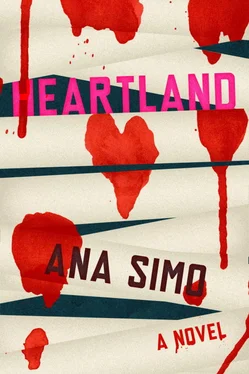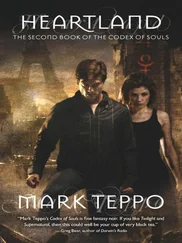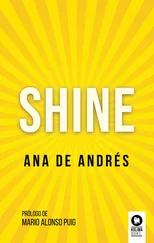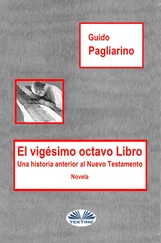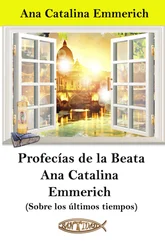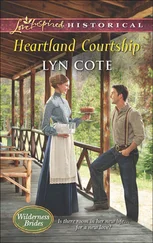On Christmas Eve, I was in the kitchen at daybreak, needing four hours to do what Petrona would have done in one. Now her terror again filled the kitchen. Something far more malevolent than la migra had chased her. Had the English-only vigilantes who roamed the backwoods at night threatened her? Had she or her shriveled man stolen from one of the Negro drug dealers who lately controlled the outer edges of Shangri-La? Had I seen the contours of the Aztlán eagle on her car’s putrid chassis? The side of venison wrapped in transparent plastic drove Petrona out of my mind.
The venison had spent the night in the Judge’s king-size Sub-Zero fridge. It now stretched on the heavy oak kitchen table as luxuriantly as Mrs. Crandall’s body on the library table. The color pattern was different, though: here pale red meat, pure and fatless, over light brown wood; there, sumptuous, creamy flesh overflowing a polished cherry slab. I had never butchered venison before. I followed an illustrated primer self-published by a Pennsylvania resettlement camp butcher that I found tucked inside a cookbook. It was much more difficult and time-consuming than he claimed. Separating the meat from the bones and the muscle tissue required considerable strength and precision. At one point I moved the venison to the floor, to get better leverage. Six hours later, the pieces of venison were neatly stacked in the refrigerator, ready for cooking. Cleaning the butchery required another three hours: the table and the surrounding floor were splattered with blood, bones, and scraps of discarded meat. Blood had dripped between the planks, where it coagulated. I discovered it while looking for the source of the stench that persisted even after I had washed all floors and surfaces, and dumped the securely bagged venison waste in the garbage can outside the kitchen. It took me another hour to scrape the blood out of the floor cracks with a rusty scalpel I found in the Judge’s toolbox, and to apply bleach onto each crack with an eye dropper, precisely, so as not to damage the polish on the wooden planks.
McCabe had loved meat. I thought about it in the past tense while butchering the venison. I could not bring myself to put it in the present, even when I imagined her at that very moment eating a bloody sirloin for lunch in Manhattan, or dining on Eisbein mit Erbspüree in Berlin, or breakfasting on kaorou in Beijing. Wherever she was, she would be either eating, digesting, or preparing to eat meat. Meat and birds, dead or alive, were her only bodily interests, but her expanding empire was her true passion. I had imagined McCabe bored with her art dealing, content with the money and power she already had, and eager to move on to something that fed her spirit. Wasn’t that why she had become a nurse, an ornithologist, my patient pupil? Wasn’t that why she so quickly dispatched the fresh load FedEx brought her every morning from Manhattan? I had mistaken her tactical brilliance for lassitude, my material poverty for wisdom. Butchering the venison, I searched for a quality in my person. I found none. McCabe’s immolation would become my only quality.
The bone structure of the deer is not unlike ours, though the backbone is thicker and wider because it must support a full belly. The muscles that prevent backbone and belly from collapsing from the pull of gravity are also twice as fibrous and numerous than those of the average Caucasian human male. The legs, however, are similar, except that there are four instead of two. The animal kingdom consists of pieces of walking, breathing, jumping, fornicating, dim-thinking meat, on two or four legs. I am referring to us, mammals. I once dreamt that I was a pig rooting for truffles on the banks of the Little Ohio. Another time I dreamt I was a prairie dog running in the snow in the last remnant of the Great Prairie, which almost touches Elmira County in the west. In the summer, you can see it swaying in the distance if you climb a tree in Shangri-La’s cemetery. The Great Prairie was my Sargasso Sea, my Caribbean, boiling or frigid, my Red Sea parting, my home within home. I sat in the tree with my father’s binoculars trained on the golden waves. There I saw Moses, Billy the Kid, and Captain Morgan, who had set fire to San Cristóbal de La Habana centuries ago according to my father. The binoculars warped the tips of the prairie grasses and the line of the horizon. I took this to be proof that the earth was flat, even when I knew it was round. The Judge, who hated opera, had slipped his binoculars to my father before his annual fall trip to New York with Mrs. Wilkerson, hoping to avoid yet another Forza del Destino at the wretched Met. It did not work. She forced him to go anyway, my father later told me.
By the time I finished cleaning up, the sun was a pale yellow smudge dropping behind the icy rosebushes. The saddest winter sight in Elmira is that pale yellow twilight that replaces the afternoon. It made my mother walk around the house with pursed lips and a glare in her eyes. My grandmother advised me to keep clear of her daughter on those days. “She has a malignant streak,” she told me, hesitating between regret and pride. “But,” she added (and I knew what would follow: an indictment of my father), “He provokes it in her; he’s no saint.” As usual, she clammed up when I asked her what exactly he did wrong. I couldn’t see it and was afraid that I, too, might be provocative and un-saintly. “You haven’t done anything,” my grandmother said, pulling me into her fat lap. This was the beginning and end of many of our conversations. To her mind, I could do no wrong. I nevertheless mimicked my father, scurrying around the house, eyes glued to the floor to avoid my mother’s incinerating gaze until the whistling in the kitchen signaled that all was back to normal. My mother couldn’t whistle a tune any more than she could sing, but it was the happiest sound in the world for the three inmates in her fearsome prison.
My mother’s choleric winters continued until the day she died. And one year, winter drove Ezequiel Cohen mad. The sixth-grade English teacher had explained the meaning of “the dead of winter,” which in Elmira fell in February. Despite our protestations, Rafael and I were paired to do a five-hundred-word essay on the subject. We fought whenever we tried to write together, so this time I wrote the text and he did the illustrations. One showed a boat trapped in the ice in the Little Ohio River. Another showed a woman and a boy at table while snowflakes swirled outside their window. On a couch, nearby, a man slept under a green tartan blanket. All three had curly black hair. The teacher asked who the man was. Rafael said it was the grandfather. I knew it was Ezequiel, who had been lying in exactly the same position under a green Army surplus blanket for almost a week. When Ezequiel first failed to get up from the couch to go to work, Genoveva ran in tears to my mother, as she always did. My mother and my father, separately and together, went to talk to Ezequiel, who didn’t answer them either. It was then decided to leave Ezequiel in peace until he ran out of sick days. We were to pretend he was not there. Water and food were left on the windowsill by his couch. They remained untouched during the day. In the morning, they were gone. I was sitting alone at his dining table, revising my “In the Dead of Winter” essay, when Ezequiel spoke from his couch, slowly and laboriously, in English, a language he officially could not speak. “He was uncircumcised in flesh, but not in heart,” he said. He looked like someone who had chewed on something bitter. Then he shut his eyes, exhausted by his first and only bout of eloquence in the alien tongue. I never told anyone. This happened on a Saturday. By Monday Ezequiel was back to mopping the school hallways, all smiles as usual.
Читать дальше
